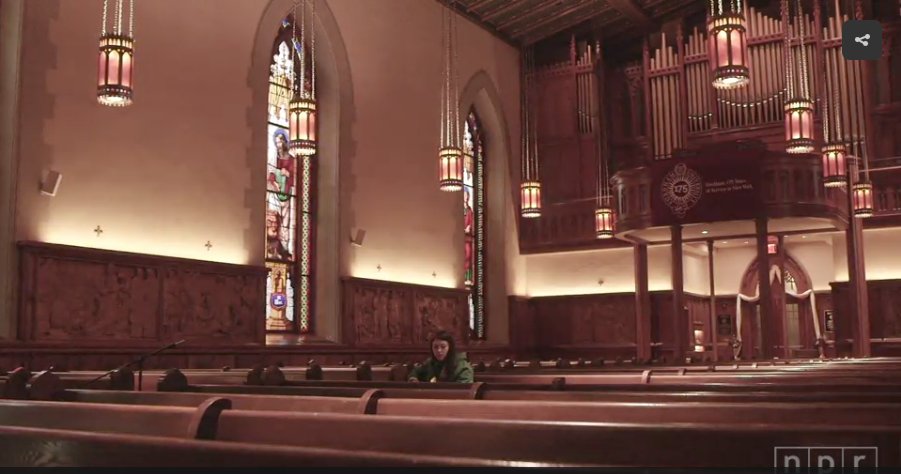The Church and Healthcare in Light of COVID-19’s Effects on Minority Communities
As we examine the disastrous wake COVID-19 has left in our communities, we must acknowledge that the pandemic has disproportionately affected Black and Indigenous people of color (BIPOC). Thus, we are left questioning the equity of our national systems and institutions, which are historically intertwined with religion. As a Jesuit institution in the Bronx, Fordham must grapple with its faith’s complicated history and its modern implications in order to enact real change against the ongoing discriminatory practices today.
According to the CDC, the mortality rate for COVID-19 among African Americans is more than two times higher than that for white people, while Indigenous people are 3.5 times more likely to contract the virus than their white counterparts. The Bronx — New York City’s poorest, most densely populated and ethnically diverse borough — has reported the highest hospitalization rate due to the virus out of all five boroughs. Experts agree that these negative outcomes stem from systemic issues that prevent equal healthcare access, regardless of race and ethnicity.
BIPOC have long experienced disproportionate access to healthcare resources due to the racial wealth gap, medical racism, lack of culturally competent care, underrepresentation of minorities in the medical field, mistrust of the system due to instances such as the Tuskegee experiment and more. Our healthcare system continues to fail them as its flaws are systemic and originate from the horrors committed throughout American history, which, at times, were accompanied by oppressive Christian rhetoric. Ultimately, when confronted with these startling COVID-19 statistics, we should ask why we continue to see our minority groups suffer from oppressive institutions time and time again?
The answer would be shocking for many Americans: These institutions’ exclusionary practices are performing just as they were intended to when they were built by colonizers long ago. These flaws lie in America’s dark history, where trauma originated in the expansion of white Christendom by Europeans in 1492. The Spanish conquistadors committed genocide of millions of indigenous Americans on religiously validated grounds in the name of Christian conversion. Pope Alexander VI endorsed Spanish dominion over the Americas and unwittingly established a new social order which elevated white Christians and began the phenomena of white Christian supremacy that would dominate the region for centuries up until present day. This notion would go on to infect American legislation, and its remnants still exist in our flawed institutions.
Shortly thereafter, the genocide and enslavement of millions of Africans took place for the purpose of building the infrastructure of the white Christian nation. These damaging effects have rippled throughout history to affect all spheres of Black life today. Although completely out of line with scriptural teachings, many religious figureheads in this era, such as Bishop John Henry Hopkins, utilized the Bible in order to justify slavery in the name of necessity and economic growth. Such racially loaded statements by powerful religious institution representatives surely affected legislation and public sentiment in this era. In brief, much of American trauma to our minority communities and the institutions that serve them has coincided with equally oppressive Christian rhetoric.
In light of the rise of the social movement Black Lives Matter (BLM) because of police brutality and the murders of innocent African Americans such as George Floyd and Breonna Taylor, the Church is beginning to step forward to denounce racism in a more firm, public manner. The Pope recently declared that “Instances of racism continue to shame us for they show that our supposed social progress is not as real or definitive as we might think.”
Similarly, throughout the pandemic, many religious figureheads have come forward to address this disparity, and most recently, the Catholic Health Association (CHA) proposed an initiative to prioritize health equity as “COVID-19’s greater impact on communities of color and the police killings of George Floyd and others demonstrate the urgent need to address the devastating impact racism has on the health and well-being of individuals and communities,” declared Sr. Mary Haddad, RSM, CHA president and CEO. Many modern Christian responses to injustice such as this one tend to take on a more Christ-like view of the marginalized, which calls us to “Speak up for those who cannot speak for themselves, for the rights of all who are destitute. Speak up and judge fairly; defend the rights of the poor and needy” [Proverbs 31:8-9 (NIV)].
But the truth of the matter is that, despite the uptick in Christian awareness on this issue, BIPOC in America receive fewer resources, and often lower quality resources, than their white counterparts. This still begs the question: Are we focusing on the systemic historic roots of these issues or are we simply confronting its outlying effects? The current circumstances of obvious tragedy and death in the wake of COVID-19 in these communities, compounded by the effects of police brutality, is enough to justify further reflection into how our systems operate and how Christianity as an institution has influence over legislation and social sentiment.
In showing Christianity’s complicated relationship with oppressive misuse, I want to call attention to the historic abuses of power that have coincided with its dominating use over minorities. For this reason, we must recognize the full truth of the faith’s history so that we can begin to repair our communities and the institutions that serve them. Perhaps if there weren’t such polarizing debates around systemic solutions such as universal healthcare and defunding the police, it would be easier to rebuild these systems rather than uselessly aiming to simply combat their outlying effects. As a Jesuit institution, if we can acknowledge Christianity’s complicated history and arm ourselves with scriptural teachings which promote health equity for all in this trying time, we may have better luck treating these complex issues.
Ashley Blasi, FCRH ’22, is a biology and Latin American studies major from Albuquerque, N.M.








































































































































































































